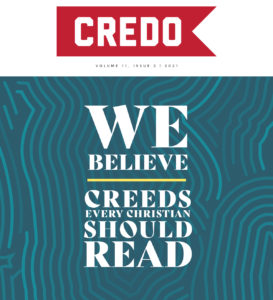It is the democracy of the dead. Tradition refuses to submit to the small and arrogant oligarchy of those who merely happen to be walking about. –G.K. Chesterton, Orthodoxy
Today we are experiencing a surge of renewed interest in retrieval. However encouraging that resurgence may be—and it certainly is reassuring—a lingering, even nagging hesitation remains among a remainder of theologians and pastors. Those reluctant are not identical with those alarmist fundamentalist “no creed but the Bible” types. Such an overt, frantic biblicism is conspicuous enough as a theological cancer. Instead, it stems from that type of theologian or pastor who appreciates the past, but nonetheless considers engagement with our Christian heritage as nothing more than a pragmatic recruitment of conversation cronies. At the end of the day, they are far more interested, so they say, in what the Bible says. Putting labels before that word “tradition”—whether it be “Great” or “Reformed”—is precarious business sure to distract from scripture or even overcome its message.
In a strange way, I almost prefer to battle with the overt, alarmist “no creed but the Bible” types than this second, more subtle biblicist. At least the former is honest. Disastrous no doubt, but honest. But the latter represents that quiet, almost indetectable cancer that is never caught by a doctor. Concealed, it infiltrates the blood system over years, even decades. When it’s finally identified for what it is everyone stares at the floor in defeat knowing it’s much too late. “You have three months to live,” says the helpless physician, conquered by a battle he never had the chance to help his patient fight.
Why is this more subtle form of biblicism so fatal to the health of the ecclesiastical body? It is so threatening because it preys on Christianity by means of a half-truth. It acts as if the past is important; it even encourages dialogue. Yet by the end of the day, its reason for doing so is quite secular: talking to the dead is merely pragmatic. If you find the Nicene Creed or a Calvin or an Augustine helpful, then by all means. That is, as long as they become nothing more than practical, mere aids to what really matters.
Such an approach succumbs to subjectivism. Digging up the past merely to find a convenient dialogue partner, one we might use for our agenda, treats history as a prostitute. Retrieval loses its holy intention, its sacred ambition. No longer does it take the form of a servant; instead, it becomes an appliance.
Furthermore, this subtle biblicism is so hazardous because it replaces a tradition faithful to the scriptures with a tradition of its own, a tradition of one. A tradition of me, myself, and I. A tradition better labeled individualism. In the end, it doesn’t escape the same outcome of “no creed but the Bible,” namely, “no creed but my creed.” Claim as they will to just believe the Bible, what they are really after is their reading of the Bible. That, ironically enough, is a creed by itself and a creed for itself.
Friends, there is a better way than historical pragmaticism, that random rummaging of the past for a dialogue partner who will applaud your position. We put our finger on the pulse of retrieval when we look beyond ourselves to hear the body of Christ speak about its head. To be blunt, those with subtle disbelief in retrieval have, in truth, a subtle skepticism of the church, Christ’s bride. Yet Thomas Torrance corrects our perception when he confesses,
I believe, we learn far more about God as Father, Son and Holy Spirit, into whose Name we have been baptized, within the family and fellowship and living tradition of the Church than we can ever say: it becomes built into the structures of our souls and minds, and we know much more than we can ever tell. This is what happens evangelically and personally to us within the membership of the Church, the Body of Christ in the world, when through the transforming power of his Word and Spirit our minds become inwardly and intuitively adapted to know the living God.
Tradition glows best when we move aside and let it illuminate the gospel and its God. Its effulgence is, of course, derivative from the Son and his inspired Word. Yet it casts a light that serves to radiate not just biblical texts but biblical logic. That logic becomes a mother, giving birth to a theological rationale that can guide the fallible reader down the interpretive trail of scriptural pages. That trail, however, is littered with land mines. Tradition walks in front of you, sacrificing herself so you can find your way home. Only the fool pushes her aside to take the lead.
The reason tradition is so “helpful”—though I hate that word more and more these days—is not because we use it but quite the reverse, it has a way of using us. She serves to correct our assumptions, expose our blind spots, and cultivate accountability in a garden we have turned into a wasteland. But most of all, she introduces us to creeds so that we do not gather as one but join the assembly of believers now and yesterday to praise the King of glory with one voice.


